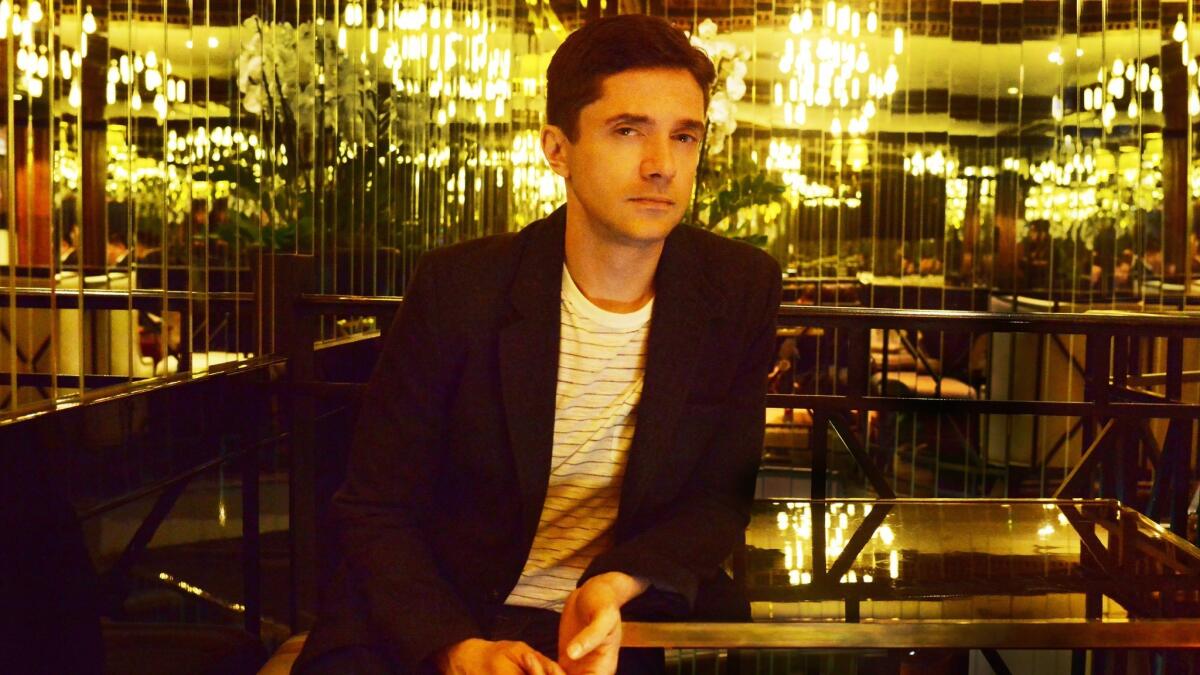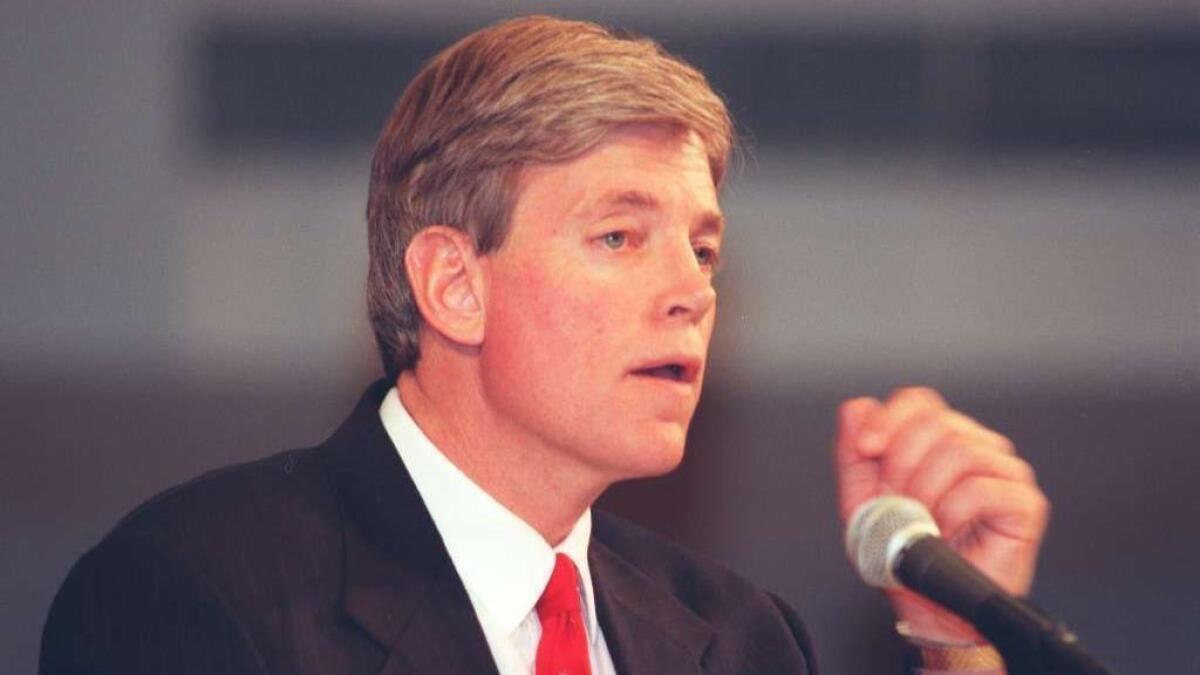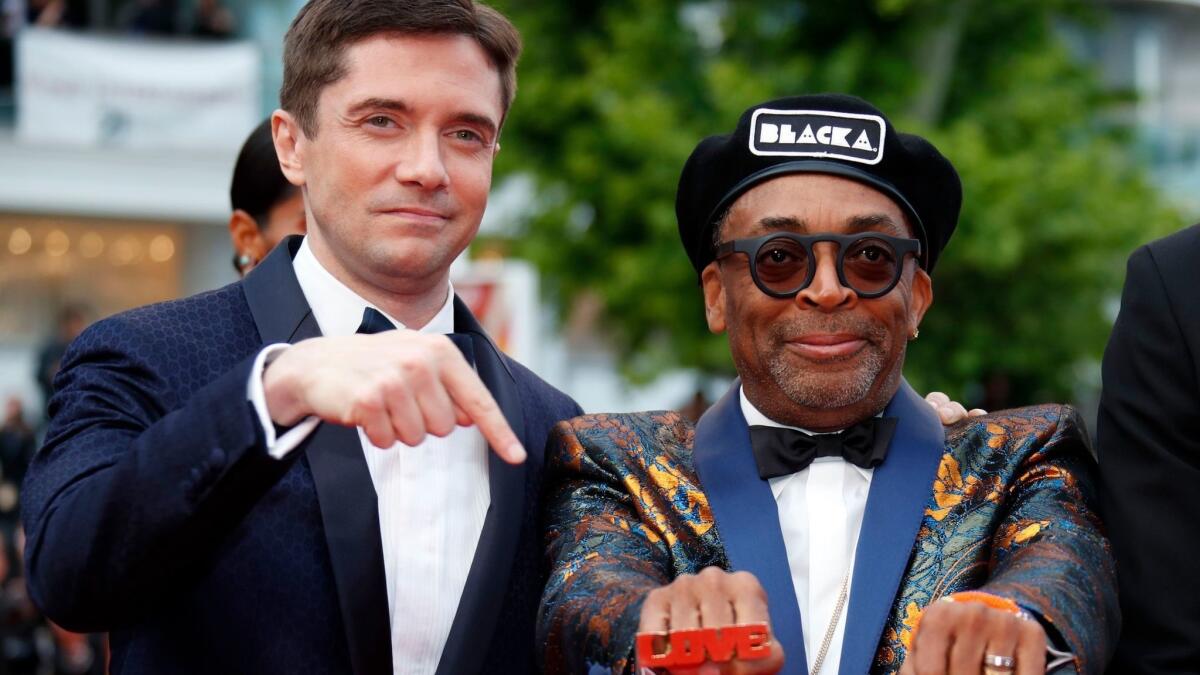Topher Grace’s mission to reinvent himself takes a quantum leap with Spike Lee’s ‘BlacKkKlansman’

- Share via
Five years ago, Topher Grace looked at his bank account, and he was actually satisfied with the number he saw.
After spending eight years on “That ‘70s Show” and starring in commercial films such as “Spider-Man 3” and “Valentine’s Day,” he’d built up a solid chunk of change. Plus, he’d recently met the woman he was going to marry, and he was feeling more comfortable in his skin — like he didn’t have to impress anyone anymore. So he decided to set up a call with his agents and managers.
“I really don’t want to do anything that’s not with an auteur filmmaker,” he told his team. “Or at the very least, a filmmaker that I’m really, really excited about.”
Their response was muted, Grace recalled.
“Cool! Let’s just do one more for money,” he said they suggested. “You know, one for them, one for us?”
“No,” the actor said. “I’m really done doing that.”
But it was only last week at the Cannes Film Festival that the 39-year-old felt confident he’d made the right decision. The actor appeared in the only two American films in competition for the Palme d’Or, David Robert Mitchell’s “Under the Silver Lake” and Spike Lee’s “BlacKkKlansman.” His role in the latter earned him particularly strong reviews: He plays a young David Duke, then the Grand Wizard of the Ku Klux Klan, who is fooled into becoming friends with a black cop he believes is white.
Even before the film premiered at the prestigious festival, movie fans seemed surprised to learn that the goofy dude from “Win a Date with Tad Hamilton!” had taken on such a serious role. When the trailer went up online, the Twittersphere was shook: “i’m screaming at topher grace as david duke???” wrote one user. “Topher Grace as David Duke? This movie is gonna be wild,” tweeted another.
“It’s hard to know what you are as a product, but whatever I was, I don’t think anybody thought it was playing David Duke,” said Grace, sitting in the lobby of his fancy hotel on the Croisette last week, where everyone seemed to be speaking French and ordering burrata. “I think there’s kind of a feeling of, like, ‘He can’t do that.’ A lot of actors think, ‘Oh, maybe it’s bad for my career to play someone who’s evil and they might think I’m bad.’ But I don’t care. I really don’t care.”
Grace’s reinvention began on Christopher Nolan’s “Interstellar,” the 2014 sci-fi film. He only had a small supporting role, but the experience still felt revelatory.
“The time I spent there was so much better than doing 10 of these other movies that I had done, and I knew: ‘This is just it. I have to work with people like this,’” he said.
On set, he opened the cupboard in the home of his character — an interior that would never be shown in the film — and was shocked to see a slew of corn-related products: Corn Pops, creamed corn, popcorn. When Grace asked Nolan why he’d created such detailed props, he explained that because the film was set in the future, the food was meant to represent that society had become completely reliant on corn syrup.
“He went so deep into it, and my mind was blown,” Grace said. “I thought: ‘This is not an experience I’d been having on other films.’”
Grace went on to costar with Cate Blanchett and Robert Redford in the 2015 journalism film “Truth,” and last year he was part of David Michôd’s “War Machine” with Brad Pitt. So when he received the script for Lee’s latest project, he just hoped there would be something in it for him. After reading the “BlacKkKlansman” script, he thought he might have a take on Duke. He liked how Lee depicted the KKK leader as evil but still poked fun at him. And when he googled “David Duke 1973,” he thought he bore enough of a physical resemblance to the guy that he could pass off the role believably.
“So I called my agents, and they were not unsupportive, but just weirded out by it,” Grace said with a laugh. “They told me I’d have to come in and read for Spike, and absolutely. I certainly have a lot of friends who won’t audition as a rule. But I don’t care at all. I wouldn’t have gotten it if I didn’t.”

You pray for roles like that as an actor, where you can just kind of sink your teeth into it.
— Topher Grace
He spent the next few weeks diving into Duke’s mind — a process he found uncomfortable. He listened to the KKK veteran’s daily radio show, watched his appearance on the Phil Donahue show and read his autobiography, “My Awakening: A Path to Racial Understanding.”
“I had a lot of difficulty preparing for the reading,” Grace said. “Those are words that I just don’t say and words I don’t even think. So to be saying them even in the privacy of my own office at home felt like some kind of betrayal to myself.”
“He’s very even-tempered, which is really scary,” he said of Duke, who did not respond to a request for comment for this story. “He was very charismatic, very intelligent. And you know, a lot of the worst leaders of all time have been very charismatic and media-friendly.”
When Grace eventually walked into the audition room, he said, he was open with Lee: “I’m sorry, I’m sure you’ve heard this before — maybe every actor has come in here saying this — but I just have to tell you how hard this is and how terrible this is.”
Lee told the actor that Duke’s words were in service of the film’s larger message, which made Grace feel more at ease. And he won the part.
“Spike was like, ‘Topher’s our guy,’” said Raymond Mansfield, one of the film’s producers. “And we all thought, that’s a really interesting, unexpected idea. Was it the first name that we would have brought up? Probably it would not have been. ‘Topher Grace from “That ‘70s Show” is playing David Duke?’ And yet at the premiere, there were a lot of Topher posters — more than you would have ever thought from fans who were just hanging out. You realize he really has a global fanbase.”
On set, Grace and Lee established an easy rapport, and the vibe was oddly lighthearted — the filmmaker had a deft touch, offering the actor only “two or three directions.”
“Certainly I was feeling like, ‘These are muscles you haven’t used before,’” Grace said. “[Duke] is not a great person, or even a good person, but the role is delicious. You pray for roles like that as an actor, where you can just kind of sink your teeth into it.”
Grace was raised Episcopalian, though he now defines himself as a “Christmas and Easter Episcopalian.” He spent his adolescence in the affluent suburb of Darien, Conn., where there was such a lack of diversity that he “voluntarily went to boarding school” at New Hampshire’s Brewster Academy in an attempt to broaden his horizons.
“But I know my experience is what it is. I’m just saying I didn’t grow up relating to my peers,” Grace said. “With this movie, my fear was not that anyone who is black or Jewish would come up to me and be weird with me; my only fear was that someone who was white and racist would kind of look at me in a crowd and go ‘You get it’ and relate to me. That’s where you have to trust someone like Spike and know that at all times they will let the audience know that what you are doing is not glorified.”
Still, heading to Cannes — where he’d never been before — Grace was nervous. “BlacKkKlansman” and “Under the Silver Lake” (a contemporary noir starring Andrew Garfield, in which Grace plays his hipster drinking buddy) were not only the lone American films in competition, they premiered on back-to-back nights. The entertainment news site Deadline had already dubbed Grace “this year’s Nicole Kidman” (the actress had four projects at Cannes in 2017). Could the experience live up to the hype?
“You know what I’ve been telling people? That this is what I thought Hollywood was gonna be like before I moved to Hollywood,” he said. “Bow ties and red carpets and champagne and we’re on the water. People love cinema and really care about art.’ When I was younger and I watched ‘Singin’ in the Rain’ and thought ‘Well, I’m going to Hollywood!’ the reality is something else. But this feels like it.”

He was especially moved, he said, while walking up the stairs of the red carpet. He’d always seen photos of the epic entrance but cynically wondered: “How great can that be?” Yet while approaching the Lumiere alongside Lee — watching him face the crowd and earn applause — he was overcome by emotion.
“It was a confirmation, emotionally, of what had been kind of an intellectual decision for me,” he said, speaking of his career shift. And with both of his Cannes premiere titles slated for theatrical release this summer, he’s ready for what’s next.
“I think I have the ability to say I want to try different things now, because I’ve been in the industry for a while. I just wanna work with people who are inspiring to me and I’m inspired on the set. Does that sound too – you know what I mean? — I really mean that. I’m trying to really stay in the moment and think: ‘Look where this led you.’”
Follow me on Twitter @AmyKinLA
More to Read
Only good movies
Get the Indie Focus newsletter, Mark Olsen's weekly guide to the world of cinema.
You may occasionally receive promotional content from the Los Angeles Times.











